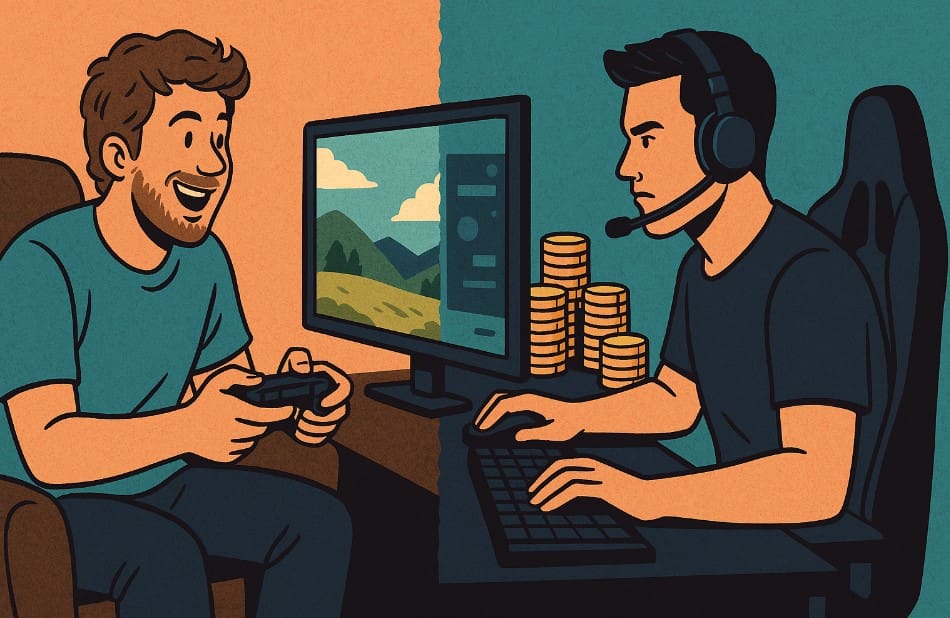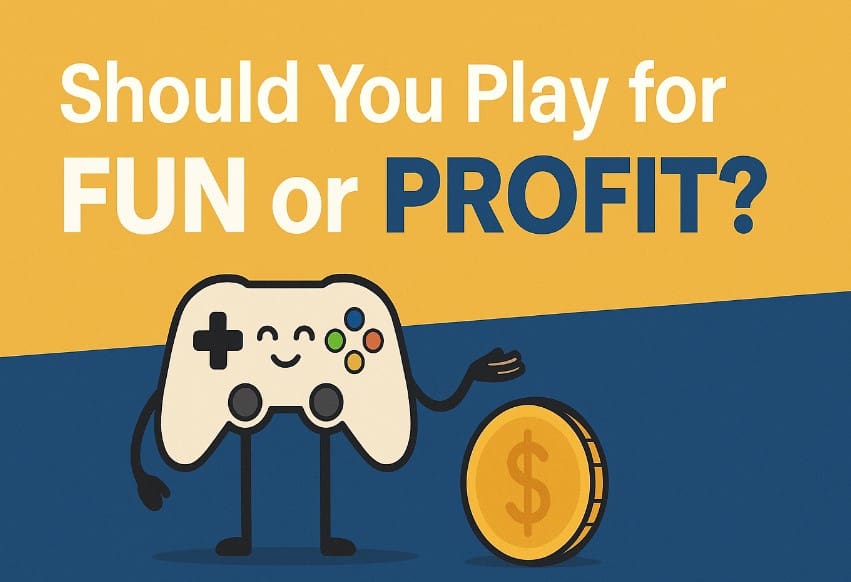Gaming means different things to different people. For one person, it’s a guilty pleasure after work with a bag of chips in hand. For another, it’s a carefully structured grind that might pay the bills. The question of whether to play for fun or profit is a bit like asking why someone goes to the gym: some do it to stay fit, others dream of medals, and a fair few are just there to hang out and gossip on the treadmill.
What Does It Mean to Play for Fun?
Playing for fun is straightforward. You boot up a game because you enjoy it, plain and simple. Maybe it’s the story that draws you in, or maybe you just like the sound of the dice rolling in a digital board game. There’s no spreadsheet tracking wins and losses in the background.
Take my friend Sam, for example. He plays Mario Kart religiously but couldn’t care less about rankings. If he gets blue-shelled three times in a row, he just laughs and shrugs. That’s the essence of fun-driven gaming: the stakes are low, the laughs are high, and nobody’s yelling about ROI.
Fun gaming is also forgiving. You can try silly strategies, wander off into corners of maps nobody cares about, or play as the underpowered character just because you like their outfit. There’s freedom in not caring about whether every choice is “optimal.”
The Appeal and Benefits of Playing for Profit
Now flip the script. Playing for profit is a different beast. Suddenly, time in-game starts to feel like training hours. Mistakes are costly, literally. And yet, for many players, that’s the thrill. It’s like being on a sports team where the competition keeps you sharp.
Professional gamers often describe the grind as both exhausting and exhilarating. Think of poker players—many treat each session like a business meeting, complete with bankroll management, emotional discipline, and a dash of gut instinct. One acquaintance of mine spent months charting hands in a notebook before he ever made a consistent profit. That’s not a casual hobby anymore; that’s a career move.
There’s also pride involved. Earning from games isn’t just about money—it validates the time you put in. A streamer who starts with five viewers and builds up to hundreds will tell you the growth feels as rewarding as the income.
Risks and Downsides of Playing for Money
Here’s the rub: the moment profit enters the equation, the joy can start leaking out. What used to feel like freedom can start resembling a 9-to-5 job. Burnout is rampant. I’ve seen friends turn sour on games they once loved because every play session felt like work.
Financial risk is no small matter either. Sure, headlines love to highlight eSports millionaires, but for every breakout star there are thousands of talented players grinding in obscurity. In gambling-related games, like slots or poker, the odds are stacked even harder. One bad night, and all your “earnings” vanish.
Then there’s the social side. When you’re playing casually with friends, losing a match is just banter fodder. But if money is on the line, suddenly jokes dry up. The vibe shifts from lighthearted to laser-focused, and not everyone enjoys that.
Comparing Casual and Competitive Gaming
Casual and competitive gaming are almost two different cultures. Casual players value laughter, discovery, and camaraderie. Competitive players prioritize discipline, strategy, and measurable outcomes. Neither side is inherently better—it’s about what scratches your itch.
Sometimes the lines blur. My cousin, for instance, loves FIFA. Most of the time he’s just playing career mode for fun, but every so often he enters online tournaments where the mood shifts instantly. He’ll go from relaxed button-mashing to rehearsing corner kick strategies like a coach prepping for the World Cup.
Real-World Examples: Hobbyists vs. Professionals
Hobbyists are everywhere. Maria, who spends her evenings decorating her Animal Crossing island, doesn’t care if her setup is worth a dime—she’s in it for the zen. Contrast that with Lee “Faker” Sang-hyeok, the League of Legends legend, whose daily routine involves scrims, replays, and a pressure cooker environment where fans expect perfection.
And then there are hybrids. Twitch streamers often start out just messing around, only to wake up one day realizing they’ve turned their living room hobby into a paying gig. I know one guy who joked he “accidentally got a second job” because his casual streams blew up.
Factors to Consider Before Choosing

Before deciding how seriously to take your gaming, a few questions help cut through the noise:
- Why are you playing? For laughs, stress relief, or competition?
- Can you stomach losses? Both financial and emotional.
- Do you have time to treat gaming like work? Because that’s what profit-driven play requires.
- Do you thrive on community or solitude? Casual gaming tends to be looser; competitive scenes can be intense.
- What’s sustainable for you? Could you still enjoy the game if it stopped paying?
How to Balance Fun and Profit in Your Play
Striking a balance is possible, but it takes intentional choices. Some players draw hard lines—keeping certain games purely for relaxation while approaching others with a profit mindset. A poker player might mess around with board games on weekends, just to keep gaming light.
Others build in boundaries. I’ve met streamers who set aside one night a week to play “off-camera,” just to reconnect with the joy of gaming without worrying about chat or donations. Even something as simple as limiting how much you stake in a gambling game can make a huge difference.
A little self-check now and then helps too. Ask yourself: does this feel like fun, or like work I resent? If it’s the latter, maybe it’s time to shift gears.
Why Both Perspectives Matter
Fun and profit don’t have to be enemies. They’re more like lenses you can swap out depending on your mood. Some days you want the lighthearted chaos of a casual game with friends. Other days, the satisfaction of a well-earned win in a competitive setting feels unbeatable. The healthiest players I’ve known can slide between both modes without losing sight of why they started gaming in the first place: enjoyment.
At the end of the day, games are tools for engagement—whether that engagement is with a story, a community, or the challenge of competition. The trick is figuring out what kind of engagement fuels you rather than drains you.
FAQs on Playing for Fun or Profit
Is it realistic to earn a living from games?
Yes, but it’s rare. A small slice of players succeed in eSports, streaming, or content creation. For most, it’s supplemental at best.
Does playing for profit always reduce the fun?
Not always. Some thrive on the pressure and find it rewarding. But many discover that it makes gaming feel like a grind.
Can casual players become professionals?
Plenty have. It usually involves a mix of talent, dedication, and networking. But it’s a steep climb.
Are games designed more for fun or profit?
Depends on the game. Some prioritize storytelling and creativity, others lean heavily into monetization models.
What’s the safest way to balance both?
Keep boundaries. Let some sessions or games stay purely recreational. Treat profit-driven play with the discipline you’d give any investment.


